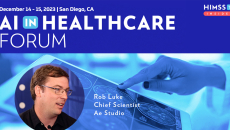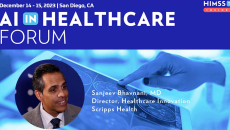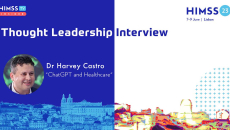artificial intelligence
Joy Liu, founder and CEO of Plenful, discusses burdens faced by pharmacists, including a shortage of pharmacy technicians and compliance challenges and where AI can step in to alleviate some of the pain.
Jonathon Feit, CEO of Beyond Lucid Technologies, describes how the company utilizes AI to analyze patient information by pulling patient data from various resources to inform and connect EMS providers with healthcare systems.
Rob Luke, chief scientist at Ae Studio, discusses how the company uses artificial intelligence internally for generating code, brainstorming ideas and helping its clients summarize data, process audio and interpret reports.
Dr. Sanjeev Bhavnani, Scripps Health executive director of healthcare innovation, discusses applying AI and machine learning in clinical care – and barriers to progress toward development around clinical adoption, including FDA policy.
Updesh Dosanjh, practice leader of technology solutions for lQVIA, discusses ensuring fairness while using AI in clinical trials, the value of digital twins and the necessity of building and consistently adapting frameworks around AI use.
Dr. Adam Landman, chief information officer at Mass General Brigham, relays how generative AI and LLM technology are changing the healthcare workforce burden and how these scalable solutions improve efficiencies within the health system.
Dr Harvey Castro, author of "ChatGPT and Healthcare," discusses his book on the use of large language models in medicine, the role of physicians in refining future LLMs and worries about physician and patient hallucinations due to LLM results.
Dr. Brian Anderson, MITRE’s chief digital health physician and Coalition for Health AI cofounder, says AI requires regulation. He discusses the blueprint CHI developed for bias-mitigation, transparency, governance and monitoring in AI.
Niall O'Connor, chief technology officer at Cohere Health, discusses how AI and machine learning can help streamline the prior authorization process by analyzing the totality of patient information and reducing denials by health plans.
Navin Natoewal of Philips and Jeffrey Schneider at the DoD discuss RATE technology, which utilizes biometric data from wearables and an algorithm to predict COVID-19 and other infections in service members 48 hours before symptoms began.









